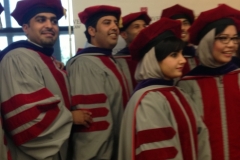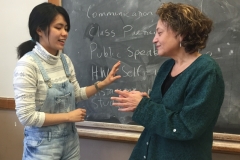MSL provides training in a unique combination of English, dispute resolution and cross-cultural communication for non-native speakers of English and the teachers, interpreters and other professionals who work with them.
MSL Programs are customized for
Non-native speakers of English
Get the English communication skills you need for
- Conflict Prevention & Conflict Resolution
- Negotiation & Mediation
- Cross-Cultural Communication
- Fluency and Confidence
Professionals who work with non-native speakers of English
Get the training you need to combine your teaching, interpreting or other work with
- Conflict Prevention & Conflict Resolution
- Negotiation & Mediation
- Cross-Cultural Communication
Law & LL.M. Programs
When J.D. and LL.M. courses in Alternative Dispute Resolution (ADR), negotiation and mediation include international & first-generation students who are non-native speakers of English, challenges arise for those students, for the whole class and for the professor.
These challenges include language, cross-cultural communication and culture – including differences in academic and legal culture. Negotiation and mediation role-plays can create particular challenges - and opportunities - for all concerned.
MSL provides
- Workshops for ADR Professors on strategies and lesson plans to address these challenges & transform them into Global Legal English opportunities
- Orientation programs for international & first-generation law & LL.M. students
- ADR courses combining English, cross-cultural communcation and negotiation/mediation for international & first-generation law & LL.M. students
Law & LL.M. Students
For law and LL.M. students who are non-native speakers of English, legal programs in English can be extremely challenging. On top of the intellectual challenges inherent in any law or LL.M. program, non-native speakers of English face additional challenges with language, cross-cultural communication, culture shock, and legal & academic culture.
When these students take a negotiation or mediation course with classmates who were raised in the U.S., multiply those challenges by 100!
An MSL course for international law and LL.M. students can prepare them to succeed, compete – and even enjoy – these important ADR (Alternative Dispute Resolution) classes.
MSL instructors have training & experience in ADR and ESL (English as a Second Language).
MSL courses provide the English language & communication skills that international & first-generation students need to participate in ADR, from classroom role-plays to real life. We cover
- Negotiation & Mediation theory, concepts and terms of art
- English idioms, vocabulary and cultural references used in ADR
- Use – and misuse - of humor during negotiation and mediation
- Key cross-cultural legal issues in ADR: the role of law in negotiation & mediation across legal systems; ethics; relationships among negotiators; the mediator's roles; apologies; tone and levels of formality, politeness and directness; working with emotions across cultures; bargaining tactics; specificity and binding nature of settlement agreeements across cultures and much more.
After an MSL course, international & first-generation students will be able to participate more fully and confidently in LL.M. negotiation and mediation courses with native speakers of English. Even more importantly, they will be able to conduct real-life negotiations and mediations - in English - with more skill and confidence.
ESL Instructors
If you are an ESL instructor, you already are a negotiator and mediator.
In every class you teach, you negotiate and mediate language, culture, participation, relationships and more.
For a fascinating new study about this, see Michelle Kohler's Teachers as Mediators in the Foreign Language Classroom
MSL builds on skills you already have and shows you how to apply them in new ways.
MSL is English for Specific Purposes (ESP) for Conflict Resolution
What does "Conflict Resolution" include?
- Active Listening
- Cross-Cultural Communication
- Conflict Prevention
- Negotiation
- Mediation
You already do this every day, right?
Who are MSL students?
- Non-native speakers of English at all levels from intermediate through advanced; K- 12; university; graduate school & law school; staff, managers, professionals and more
- People who need English for a variety of academic, personal and professonal purposes
How are MSL courses for students organized?
MSL is flexible! It can become...
- a stand-alone course
- a supplement to ESP courses in Business English, Legal English, Medical English, Aviation English, etc.
- enrichment for general ESL courses in speaking, listening, reading and writing
- a supplement to orientation programs for international and first-generation students
- an academic skills course for international and first-generation students
- peer mediation training for non-native speakers of English from K - 12 through university and beyond
Why do students love MSL lessons?
MSL students...
- improve their English skills in natural and stimulating ways - without "studying" English
- immediately apply their combined lessons in English & conflict resolution lessons to daily life
- love a good deal - two courses for the price of one!
- build confidence and empowerment - and reduce culture shock - as they learn the communication skills needed to prevent and resolve conflict - in English
Why do ESL instructors love receiving MSL training?
MSL Workshops for ESL Instructors provide professional development training that recognizes and builds on your current skills. We cover...
- conflict resolution theory & practice for your own professional & personal purposes from classroom management to faculty issues to relationships
- lesson plans, materials and activities to integrate ESL and conflict resolution
- MSL applications to your regular lessons in reading, writing, speaking, listening, critical thinking & problem solving
MSL Workshops for ESL Instructors prepare you to...
Teach MSL classes like these:
- Conflict Management for Academic Success at the University
- English for Specific Purposes: Communication Skills for Conflict Resolution
Include MSL lessons like these in your current classes:
- Turn conversation practice into “active listening” exercises
- Prepare students to role-play negotiations and mediations for Business English, literary analysis, current events, campus peer mediation programs, relationships, neighborhood & family life and more
- Teach new vocabulary, idioms and grammar points for immediate use in conflict resolution activities
- Use Getting to Yes to teach principled negotiation, reading, writing, vocabulary, grammar, academic honesty, critical thinking, problem solving and more
- Assign homework that students will love: Apply our conflict prevention & resolution lessons to your own lives - and to past & current problems in the world
Aziz Abu Sarah, a Palestinian, describes how his Hebrew class transformed him in unexpected ways. MSL® classes can provide similar experiences in English.
ESL Students
MSL courses help you become more fluent and confident in English- without "studying" English!
- While learning and practicing conflict resolution through interactive class activities and role-plays, you will naturally improve your skills in speaking, listening, vocabulary, idioms and pronunciation.
- MSL courses can include reading, writing, grammar and general academic and critical thinking.
- MSL courses are ideal for business, law, medical, social welfare and international relations students & professionals who are non-native speakers of English.
Interpreters
As Alternative Dispute Resolution (ADR) becomes more the norm and less the “alternative” in the legal world, and as the legal needs of non-native speakers of English continue to increase, interpreters are needed more than ever for formal and informal settlement conferences, negotiations and mediations.
ADR sessions are all about “understanding,” but when language and cultural differences are added to the volatile mix of emotions, factual and legal conflicts, and high stakes in terms of time, money, reputation, family and freedom vs. incarceration, how can interpreters promote – or impede – the kind of understanding needed by parties, attorneys and the court?
Agreement, Collaborate, Compromise, Impasse, Interests, Respect, Settle, Trust and even Yes and No seem like simple and obvious terms and concepts. But are you sure you'd know what the judge, mediator, attorneys and parties have in mind when they use these common words as terms of art in ADR sessions? Are you sure you'd have the best translation possible for the language and culture of all concerned in the heat of a fast-paced negotiation or mediation?
What kind of training do interpreters need to fully prepare for these sessions – and to have an edge over interpreters who have never stopped to consider the basic principles of ADR and how they impact the participants’ very deliberate and specific word choices?
There are many excellent ADR trainings that provide good general introductions to ADR, but few focus on the unique language & cultural issues that concern interpreters.
And few ADR trainings recognize the ways in which interpreters already are negotiators and mediators of language, culture, relationships and more.
MSL is geared to your specific needs – and potential - as an interpreter for
- Mandatory Settlement Conferences (MSCs)
- Voluntary Settlement Conferences (VSCs)
- Negotiations, including "hallway" negotiations
- Court-Ordered Mediation
- Small Claims Mediation
- Voluntary Mediation
- Community Mediation
- Client interviews and preparation for ADR sessions
MSL Workshops for Interpreters provide what you need to succeed as a key participant in ADR sessions:
- ADR Terminology
- ADR Concepts
- Role-Play Practice
Instructors for MSL Workshops for Interpreters are all of the following:
- Experienced ESL instructors at the university level
- Mediators with at least 40 hours of training
- JDs with court and court-connected ADR experience
- Experienced ESL and/or mediator trainers
- Trained in MSL to combine all of the above for Workshops for Interpreters
Continuing Education Credit is possible.




